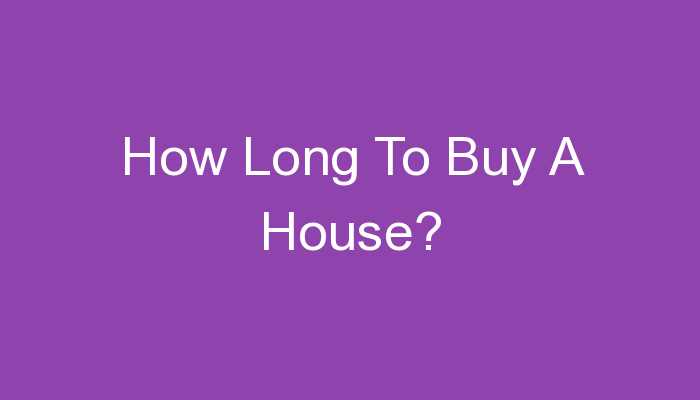Buying a house is an exciting process, and it’s one that many people look forward to. But how long should you expect the entire process to take? The answer depends on a variety of factors, such as your location, budget, type of financing you’re using and more. In this blog post, we’ll examine some of these elements in depth and provide guidance on how to plan for your purchase so that you can enjoy the fruits of homeownership sooner rather than later.
How Long To Buy A House?
How long does it take to buy a house? It really depends on a number of factors, including the type of property you’re looking for, your financial situation, the housing market, and more.
If you’re looking for a starter home, you may be able to find something suitable in just a few months. However, if you’re looking for a larger or more luxurious property, it could take much longer to find the right one. The same is true if you’re facing competition from other buyers or if the housing market is particularly slow.
Ultimately, the timeline for buying a house will vary depending on your individual circumstances. However, it’s important to remember that rushing into a purchase can often lead to regret later on. So, even if it takes longer than you initially expected, don’t be discouraged – just keep searching until you find the perfect home for you and your family.
How Much House Can You Afford?
The answer to this question depends on a number of factors, including your income, your down payment, your credit score, and the current housing market.
Generally speaking, most experts recommend that you shouldn’t spend more than 28% of your gross income on housing expenses (including mortgage payments, insurance, taxes, etc.). This number can vary depending on your circumstances, so it’s always best to speak with a financial advisor before making any final decisions.
Assuming you’re comfortable with the 28% rule, the next step is to determine how much you can afford to put down as a down payment. A larger down payment will lower your monthly payments and help you build equity in your home more quickly. However, it’s important to remember that you’ll need to have enough saved up for closing costs and other unexpected expenses.
Once you’ve calculated how much you can afford to spend on a house, the next step is to get pre-approved for a mortgage. This will give you a better idea of what interest rates you qualify for and how much house you can actually afford. The pre-approval process also gives sellers confidence that you’re a serious buyer who is financially capable of completing the purchase.
How Much Does It Cost To Own A House?
The cost of owning a house can vary greatly depending on the size and location of the property, as well as the type of home. A small starter home in a rural area may cost as little as $50,000 while a large estate in an urban area could easily cost millions. In addition to the purchase price of the home, there are also ongoing costs associated with ownership, such as property taxes, insurance, and maintenance.
How Are Mortgage Interest Rates Determined?
Mortgage interest rates are determined by a number of factors, including the health of the economy, inflation, and the Federal Reserve’s monetary policy. In general, when the economy is doing well and inflation is low, mortgage interest rates will be low as well.
Conversely, when the economy is struggling and inflation is high, mortgage interest rates will be higher. The Federal Reserve’s monetary policy can also influence mortgage interest rates; if the Fed raises or lowers interest rates, mortgage rates will usually follow suit.
What Are The Different Types Of Mortgages?
-Fixed rate mortgage: The interest rate on a fixed rate mortgage doesn’t change over the life of the loan. This type of mortgage is good for buyers who want predictable monthly payments.
-Adjustable rate mortgage (ARM): The interest rate on an adjustable rate mortgage can change, which means your monthly payments can go up or down. This type of mortgage is good for buyers who are comfortable with some uncertainty in their monthly payments.
-Jumbo mortgage: A jumbo mortgage is a loan that exceeds the conforming loan limit set by Fannie Mae and Freddie Mac. Jumbo mortgages often have higher interest rates than conforming loans.
Conclusion
In conclusion, there are a number of factors to consider when it comes to deciding how long you should buy a house. Everyone’s situation is unique and as such, the length of time required can vary greatly from person-to-person.
Do your research and make sure that you have all the facts before making any decisions; this will ensure that you do not regret your purchase later on down the line. Buying a home is an exciting experience and if done properly, it can be one of the best investments that you will ever make in life!

